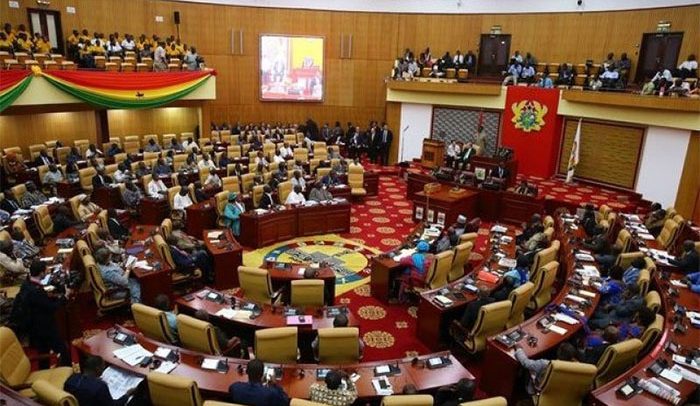Parliament has approved the second reading of Electronic Transaction Levy also known as E-levy albeit a walk out staged by the Minority side of the House.
The approval was done after the Majority Leader, Osei Kyei Mensah-Bonsu decided to forego his submission after the Minority Leader, Haruna Iddrisu has done his.
Rt. Hon. Speaker Alban S.K. Bagbin put the question for the approval of the second reading while the Minority was staging the walkout which was won by the Majority.
The bill is currently going through some amendments for the next stage.
The Minister of Finance, Ken Ofori-Atta today Tuesday March 29, 2022 moved the motion on the controversial electronic transfer levy despite initial objections raised by the Minority.
The Minority in Parliament objected to the motion because it was not captured in the business of the week.
Minority Leader, Haruna Iddrisu reiterated the Minority’s stance on the E-levy.
“When the business statement was presented last week, it [E-levy] was not part of the business approved for the house. We have warned time and again and cautioned that we dont want to be taken by surprise on a major economic policy of government. Parliament cannot be that when a side is convenient with its number, then business can go on. It cannot be. We will not accept that culture. So when they [Majority] did not have the numbers, they weren’t ready. Now, that they have the numbers, then you say we should do business.”
Despite the objection, the Finance Minister, Ken Ofori-Atta was allowed to move the motion in Parliament.
Although the bill was not captured in the business statement of the house for this week, it was listed for the second reading and consideration on Tuesday.
This comes at a time the house is filled to capacity by both members of the Minority and Majority.
“The object of this bill is to broaden the tax base of this country by imposing the levy on electronic transfer and enhance government’s drive for revenue mobilization. The levy which is expected to raise GH¢6.9 billion in 2022 is a key mechanism that the government will use to ensure Ghanaians contribute their fair share towards the development of the country. In the spirit of cooperation, government has decided to reduce the rate of the levy from 1.75 to 1.5 percent of the transfer. At the consideration stage, I will bring the necessary amendments to reflect the changes”, the Finance Minister moved.
Ruling on the matter, Speaker Alban Bagbin said, “The copies of the report are being distributed now, I don’t think it is proper for us to suspend sitting, I will give you time to read the report to make a meaningful contribution.”
The E-levy was introduced by the government in the 2022 Budget on basic transactions related to digital payments and electronic platform transactions.
The rate will apply to electronic transactions that are more than GHS100 on a daily basis. This is different from the 1% telcos charge on transactions.
The levy has sparked controversy because of its impact on mobile money transactions.
Minority in Parliament has been resisting the levy ahead of the debate on the Bill in Parliament.
Already, Ken Ofori-Atta, has blamed the minority in parliament for partly contributing to the current economic woes.
He said the minority’s lack of support for the E-levy scared investors and triggered the downgrade of Ghana’s economy by various international rating agencies.
Addressing the public on the decisions taken by the government towards reviving the economy, the Minister said the government did not anticipate the decision of the minority and so their decision not to support the levy threw its plans off-balance.
“[We didn’t expect] that parliament would approve government’s 2022 budget statement, appropriation, and its expenditure plans and then turn around to vote against one of the key revenue generation measures that were being introduced, the E-levy. The unyielding stance of the minority in parliament against the levy gravely affected investor confidence in our capacity to implement our programs and settle our debts, triggering the downgrading by credit agencies and now leaving the cedi vulnerable as we cannot access the international capital market,” he said.

By Vincent Kubi


